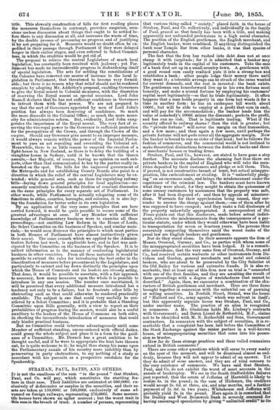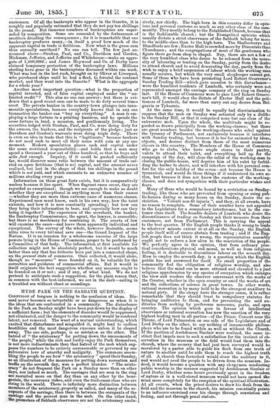STRAIIAN, PAUL, BATES, AND OTHERS.
IT is not the smallness of the sum "in the pound" that Strahan, Paul, and Co. will pay, which constitutes the startling fea- ture in their ease. Their liabilities are estimated at 680,0001. ex- clusively of deficiencies or surplus in the securities, and their as- sets are taken at 150,0001. or 160,000/. exclusively of sums ad- vanced on foreign railways, representing 276,0001. Some mercan- tile houses have shown an uglier account ; but the worst trait iii this case is the breach of trust. A number of persons, representing that various thing called " society," placed faith in the house of Strahan Paul, and Co. collectively, and individually in the family of Paul, graced as that family has been with a title, and making apparently not unfounded pretensions to a high social character. The position of the English gentleman, the English merchant, and the English banker' were combined. If anything distinguished the bank near Temple Bar from other banks, it was that species of personal character.
The fact that the firm has rushed into debt does not at once stamp it with turpitude; for it is admitted that a banker may legitimately trade in the capital of his customers. Take the case of a bank first set up in a small country-town. A gentleman with a good round sum easily realized puts it into a strong-box and establishes a bank : othet people lodge their money there until they want It; a tolerable average can be struck of the sums wanted for current demands, and the rest is invested: the bank exists. The gentleman can henceforward live up to his own fortune most honestly, and make a second fortune by employing his customers' capital most legitimately—so that he trade legitimately. It often happens that a man holds property in one form but wants it for a time in another form : he has an exchequer bill worth about 10001., but will be able to employ at a profit that sum in cash, and will pay for the accommodation; the banker lends him the value of somebody's 10001. minus the discount; pockets the profit, and has run no risk. That is legitimate trading. What if the security offered be railway shares ? then the risk is greater; but the "private fortune" will cover the margin on that transaction, and a few more; and then again a few more, until perhaps the private fortune will not quite cover all the aggregate margin. Now the banker is bound to run no risks of that kind ; but he follows the fashion of commerce, and the commercial world is not inclined to make theoretical distinctions between the duties of banks and those of merchants' houses or trading firms.
Strahan, Paul, and Co., however, are stated to have gone a step further. The accounts disclose the alarming fact that there are private bankers in the capital of England who will take the secu- rities deposited by their customers and pledge or sell them. This, if proved, is not constructive breach of trust, but actual misappro- priation, like embezzlement or stealing. It is "unlawfully pledg- ing" on an enormous scale, and brings the misdemeanant under the cognizance of the criminal law. The bankers must have known what they were about, for they sought to obtain the quiescence of some uneasy customers by assurances that the property was safe, after it had been disposed of; and then by appeals ad miseriaor- diam. Warrants for their apprehension being issued, they sur- render to answer the charge against them,—one of them after he was supposed to have escaped; and they make a full disclosure of the property unlawfully appropriated. A correspondent of the Times points out that this disclosure, made before actual indict- ment, relieves the misdemeanants from the consequences of a par- ticular statute, under which they would otherwise have been liable to transportation for seven or fourteen years. The persons thus accurately comporting themselves amid the worst rooks of the penal law are English bankers and gentlemen.
Nor do they stand alone. In their amounts appears the firm of Messrs. Overend, Gurney, and Co., as parties with whom some of the misappropriated securities have been lodged. It is a remark- able coincidence, that the very same firm of Ovetend, Gurney, and Co., had received certain warrants or other instruments from Da- vidson and Gordon, general merchants and metal and colonial brokers, who are about to be prosecuted by the City Solicitor at the Old Bailey for various and extensive frauds. It is also re- markable, that at least one of this firm now on trial is "connected with one of the first families, and they are awaiting the result of these proceedings with a degree of wretchedness that cannot be described." Again, then, we encounter a oombination of the cha- racters of British gentleman and merchant. Here are three firms brought together in connexion with the unlawful use of pawning or selling securities. In Norfolk Street, Strand, was the house of "Raiford and Co., army agents," which was solvent in itself; but this apparently separate house was Strahan, Paul, and Co., under another name. The practice of an alias is recognized in commerce. A Mr. Gladstone holds Mr. Lindsay's contracts with Government; and Baron Lionel de Rothschild, M.P., claims not to be identified with M. N. Rothschild and Sons, Government contractors. In connexion with the subject of securities, it is re- markable that a complaint has been laid before the Committee of the Stock Exchange against the senior partner in a well-known house, of misappropriating securities that came into his posses- sion as trustee.
How far do these strange practices and these veiled connexions extend in British commerce ?
There are some other questions which will occur to every reader on the spur of the moment, and will be dismissed almost as sud- denly, because they will not appear to admit of an answer. Yet they do admit of some answer, and they are of vital concern to the very existence of commerce. We have said that Strahan, Paul, and Co. do not exhibit the worst of asset accounts in the annals of bankruptcy. We see in the South Staffordshire failures just reported, that the estate of Jefferies of Hartshill is likely to realize Ss. in the pound; in the ease of Hickman, the creditors would accept 2s. 6d. at three, six, and nine months, and a further payment of 2s. 6d. in two years ; Whitehouse and jefferies will probably yield 2s. in the pound. Here again it is remarked that the Dudley and West Bromsvieh Bank is severely censured for having encouraged speculation by giving "unlimited credit" to its customers. Of all the bankrupts who appear in the Gazette, it is roughly and popularly estimated that they do not pay ten shillings in the pound. But immense numbers of bankruptcies are super- seded by composition. Some are concealed by the forbearance of creditors dreading the consequences ; for it is remarkable that one bankruptcy produces many,—in itself a proof how much of the apparent capital in trade is fictitious. Now what is the gross sum thus annually sacrificed ? No one can tell. The few just an- nounced above—Strahan, Paul, and Co., Davidson and Gordon, Hickman Jefferies, and Jefferies and Whitehouse—make an aggre- gate of 1;400,0001.; and James Heywood and Co. of Derby have claimed temporary protection of the bankruptcy laws. Millions sterling have gone in the bankruptcies discussed within one week. What was lost in the last rush, brought on by Oliver at Liverpool, who purchased ships until he had a fleet, to forestal the contract market, and then went into the Gazette ? What is the aggregate for a whole year? Another most important question—what is the proportion of capital invested, and of false capital employed under the "un- limited credit " ? This also no one can answer; but there is evi- dence that a good round sum can be made to do duty several times over: The private banker in the country-town plunges into innu- merable speculations, because everybody knows that in any one transaction the banker can "buy up everything." A man is em- ploying a large fortune in a printing business, and he spends the same fortune in land, a mansion, and gentlemanly. living. The securities lodged with Strahan, Paul, and Co. were (king duty for the owners, the bankers, and the recipients of the pledge; just as Davidson and Gordon's warrants were doing triple duty. There is even an idea in trade that this is "legitimate," because bankers do not need cash to meet all their notes with coin at any one moment. Modern speoulation places cash and capital under the same restricted responsibility—and holds that a man may spend a thousand a year out of three hundred, so that he buys and sells fast enough. Inquiry, if it could be pushed sufficiently far, would discover some ratio between the amount of trade car- ried on upon fictitious (that is no) capital, and the amount never realized, but lost in the shape of that ten shillings in the pound which is not paid, and which amounts to an unknown number of millions sterling every year. Information on these great facts exists, but it is comparatively useless because it lies apart. When flagrant cases occur, they are regarded as exceptional; though we see enough to make us doubt whether they are exceptional in anything more than their excess —whether they are more than extreme eases of numerous classes. Experienced men must know, each in his own way, how the taint extends, and how it is now constantly spreading ; but haw can they bring their information to bear, and especially how can they bring it together? The experience of the merchant, the banker, the Bankruptcy Commissioner, the agent, the lawyer, is accessible; but there is no machinery for combining it. The courts of law will examine the cases—and leave them apparently individual and exceptional. The survey of the whole, however desirable, seems ultra vires to every tribunal save one—the Grand Inquest of the Nation. It is an occasion for a wholesome exercise of the large powers lying in the House of Commons, proper to be performed by a Committee of that body. The information at first available for collection might not be absolutely perfect, but it would be much better than any that has hitherto been put into a connected shape, on the present state of commerce. Once collected, it would alone, though no "measures" were founded on it, be valuable for the correction and guidanee of commercial affairs. But it would in itself originate the best suggestion whether V measure ought to be founded on it or not ; and if any, of what kind. We do not pretend to anticipate such a suggestion, for the plain reason that, in common with the best-informed, we are in the dark—sailing in a troubled sea without chart or soundings.



































 Previous page
Previous page